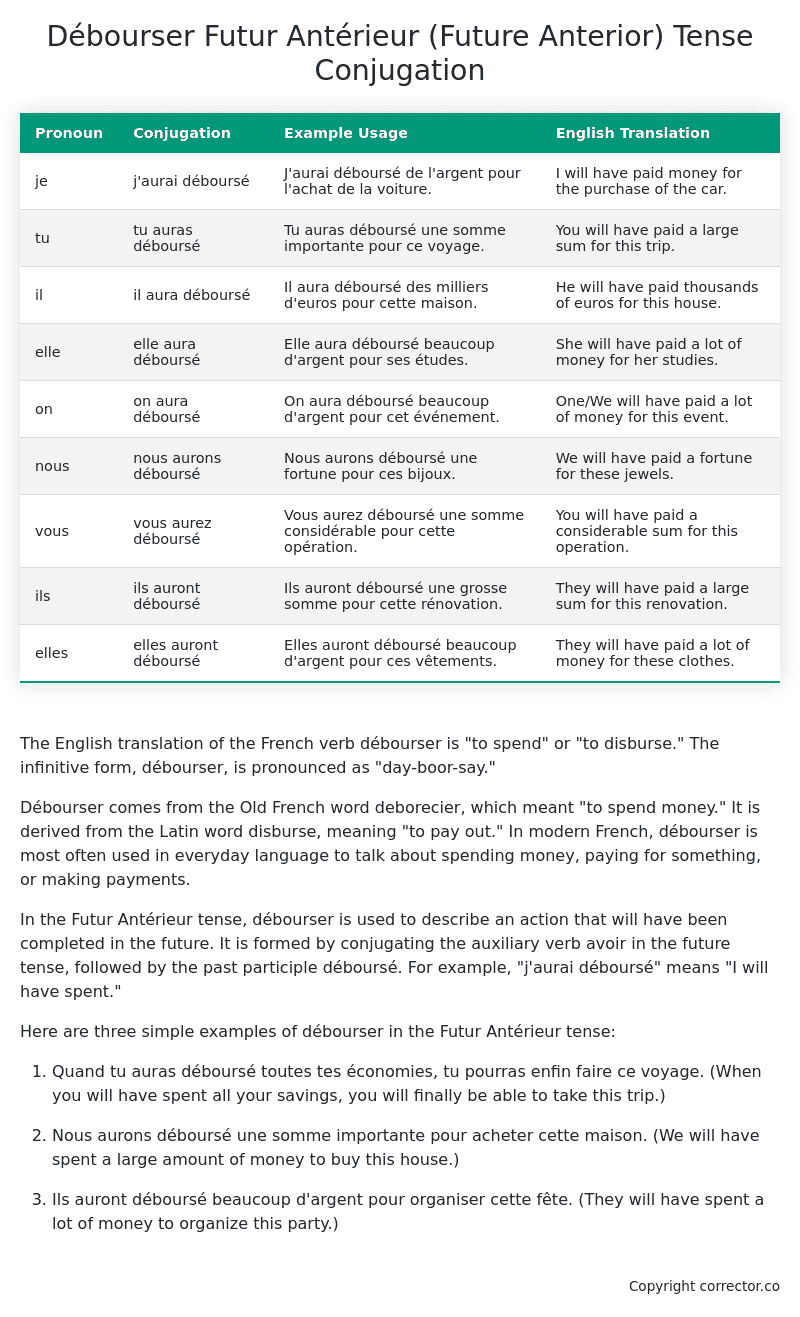Futur Antérieur (Future Anterior) Tense Conjugation of the French Verb débourser
Introduction to the verb débourser
The English translation of the French verb débourser is “to spend” or “to disburse.” The infinitive form, débourser, is pronounced as “day-boor-say.”
Débourser comes from the Old French word deborecier, which meant “to spend money.” It is derived from the Latin word disburse, meaning “to pay out.” In modern French, débourser is most often used in everyday language to talk about spending money, paying for something, or making payments.
In the Futur Antérieur tense, débourser is used to describe an action that will have been completed in the future. It is formed by conjugating the auxiliary verb avoir in the future tense, followed by the past participle déboursé. For example, “j’aurai déboursé” means “I will have spent.”
Here are three simple examples of débourser in the Futur Antérieur tense:
-
Quand tu auras déboursé toutes tes économies, tu pourras enfin faire ce voyage. (When you will have spent all your savings, you will finally be able to take this trip.)
-
Nous aurons déboursé une somme importante pour acheter cette maison. (We will have spent a large amount of money to buy this house.)
-
Ils auront déboursé beaucoup d’argent pour organiser cette fête. (They will have spent a lot of money to organize this party.)
Table of the Futur Antérieur (Future Anterior) Tense Conjugation of débourser
| Pronoun | Conjugation | Example Usage | English Translation |
|---|---|---|---|
| je | j’aurai déboursé | J’aurai déboursé de l’argent pour l’achat de la voiture. | I will have paid money for the purchase of the car. |
| tu | tu auras déboursé | Tu auras déboursé une somme importante pour ce voyage. | You will have paid a large sum for this trip. |
| il | il aura déboursé | Il aura déboursé des milliers d’euros pour cette maison. | He will have paid thousands of euros for this house. |
| elle | elle aura déboursé | Elle aura déboursé beaucoup d’argent pour ses études. | She will have paid a lot of money for her studies. |
| on | on aura déboursé | On aura déboursé beaucoup d’argent pour cet événement. | One/We will have paid a lot of money for this event. |
| nous | nous aurons déboursé | Nous aurons déboursé une fortune pour ces bijoux. | We will have paid a fortune for these jewels. |
| vous | vous aurez déboursé | Vous aurez déboursé une somme considérable pour cette opération. | You will have paid a considerable sum for this operation. |
| ils | ils auront déboursé | Ils auront déboursé une grosse somme pour cette rénovation. | They will have paid a large sum for this renovation. |
| elles | elles auront déboursé | Elles auront déboursé beaucoup d’argent pour ces vêtements. | They will have paid a lot of money for these clothes. |
Other Conjugations for Débourser.
Le Present (Present Tense) Conjugation of the French Verb débourser
Imparfait (Imperfect) Tense Conjugation of the French Verb débourser
Passé Simple (Simple Past) Tense Conjugation of the French Verb débourser
Passé Composé (Present Perfect) Tense Conjugation of the French Verb débourser
Futur Simple (Simple Future) Tense Conjugation of the French Verb débourser
Futur Proche (Near Future) Tense Conjugation of the French Verb débourser
Plus-que-parfait (Pluperfect) Tense Conjugation of the French Verb débourser
Passé Antérieur (Past Anterior) Tense Conjugation of the French Verb débourser
Futur Antérieur (Future Anterior) Tense Conjugation of the French Verb débourser (this article)
Subjonctif Présent (Subjunctive Present) Tense Conjugation of the French Verb débourser
Subjonctif Passé (Subjunctive Past) Tense Conjugation of the French Verb débourser
Subjonctif Imparfait (Subjunctive Imperfect) Tense Conjugation of the French Verb débourser
Subjonctif Plus-que-parfait (Subjunctive Pluperfect) Tense Conjugation of the French Verb débourser
Conditionnel Présent (Conditional Present) Tense Conjugation of the French Verb débourser
Conditionnel Passé (Conditional Past) Tense Conjugation of the French Verb débourser
L’impératif Présent (Imperative Present) Tense Conjugation of the French Verb débourser
L’infinitif Présent (Infinitive Present) Tense Conjugation of the French Verb débourser
Struggling with French verbs or the language in general? Why not use our free French Grammar Checker – no registration required!
Get a FREE Download Study Sheet of this Conjugation 🔥
Simply right click the image below, click “save image” and get your free reference for the débourser Futur Antérieur tense conjugation!

Débourser – About the French Futur Antérieur (Future Anterior) Tense
Construction
Common Everyday Usage Patterns
Interactions with Other Tenses
For example
Summary
I hope you enjoyed this article on the verb débourser. Still in a learning mood? Check out another TOTALLY random French verb conjugation!


